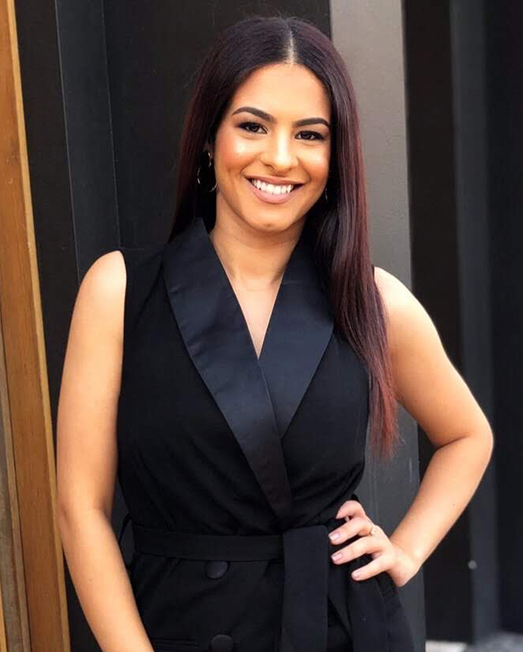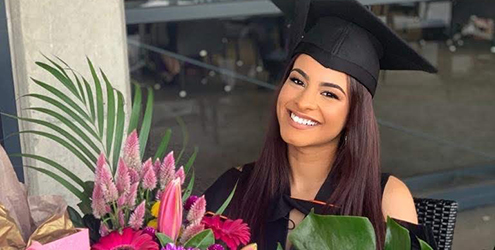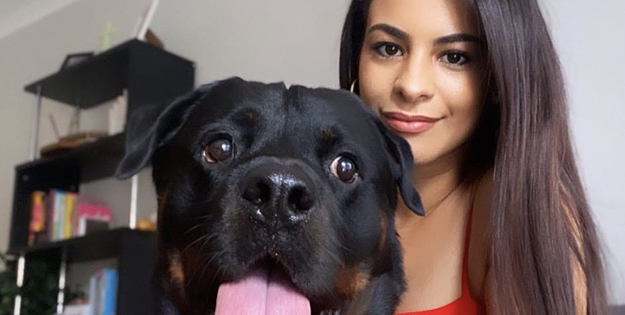Career
Copyright@ Australian Catholic University 1998-2026 | ABN 15 050 192 660 CRICOS registered provider: 00004G | PRV12008
Copyright@ Australian Catholic University 1998-2026 | ABN 15 050 192 660 CRICOS registered provider: 00004G | PRV12008

Intense and rewarding: That’s how social worker Mariam Sidrak describes her first job out of uni, where she worked as a case manager offering crisis support to women escaping violent and traumatic situations at home.
Mariam had volunteered in similar roles in her community placements while pursuing her Bachelor of Social Work at ACU, but hitting the streets as an after-hours family violence worker was still a baptism of fire for the young Sydneysider.
“At first, I didn’t really know if have what it takes, to be honest, because you’re having such big conversations about really heavy things,” she says.
“I look and sound quite young, so it felt really hard speaking with people from different walks of life, sometimes older than me, and most of them parents, and I’m giving them advice and helping them to make decisions in a crisis. All of these doubts would run through my mind, like, how do I approach this conversation?”
As it turns out, she needn’t have worried about her suitability for the job.
“I immediately had great feedback, and my peers would say, ‘Oh, you were a natural. You spoke fine. You did everything right’. I guess my instincts kicked in and they gelled together with all the things I’d learned at uni. It was just an unforgettable experience.”
Domestic violence practitioners like Mariam are on the frontline of what continues to be a national crisis, with the rising rates of abuse described as a “shadow pandemic”.
Research continues to show that women and children experience abuse at far greater rates than men do, and often live in fear as a result.
It’s one of the reasons why Mariam chose to study social work in the first place.
“I think it’s something I’ve been passionate about since childhood, the idea of serving vulnerable women and children, because domestic violence is so common in our society,” she says.
“Learning about how all the different forms of abuse can impact the lives of women long-term, it really strengthened the idea that I wanted to work in this space, to do something to help restore their dignity.”
Mariam’s unofficial training as a social worker began in earnest at a very young age.
As the daughter of a single mother who spoke very little English, she found herself acting in a support role while she was still growing up.
“I used to advocate a lot for my mum, because I could speak both Arabic and English, so I’d have to translate for her at Centrelink or with the Housing Commission and things like that, and it became second nature for me to play that support role,” says Mariam, now 24.

Mariam the graduate
Her mother had only been living in Australia for a year when she went through a divorce while still pregnant with Mariam. She spent time in a women’s refuge in central Sydney while Mariam was a baby.
“Having to figure out where you’re going to live and how you’re going to support a child you just gave birth to, it was a huge thing that my mum had to go through,” Mariam says.
“I’d say my mum did experience trauma, but probably more on the emotional side rather than the physical, and that trauma has had a lifelong impact on her.
“I’m so grateful she was able to get through that, and I want other women to feel like they can do it, too. All of these experiences have encouraged me to work with women and children, and to support them as much as I can, and I think my current role really fits that well.”
Since early 2020, Mariam has worked in child protection as a helpline caseworker, where she’s tasked with assessing if the child involved is at risk of significant harm.
“I take phone calls and emails about child abuse reports, and they can come from police officers, nurses and doctors, a neighbour or a witness, parents or even kids themselves,” says Mariam, who will soon also take calls on the domestic violence helpline, working with women experiencing abuse.
“It’s very different to my previous role because it’s not face-to-face, and the language we use is just so important … your tone, how you convey empathy and ensure you’re being mindful of their anxiety, and upholding their dignity.”
Mariam also had some exposure to social work while in her teens.
At the age of 14 or 15, she was in a counselling session with a social worker when she started to talk about her dad.
“I thought there was something wrong with my dad and I couldn’t really understand what it was, I just thought he was a bit silly sometimes,” she says.
“I would get so angry with him, thinking that he’d done or said things to deliberately upset me, or that he didn’t show up to meet me because of some other motive.”
The counsellor recognised her father’s behaviour was consistent with a serious mental health condition.

“Once she labelled it for me and gave me some understanding and resources around that, I began to realise that maybe my father’s behaviour wasn’t in his control; it was more to do with his mental health.”
Mariam soon learned that her father had already been diagnosed with the condition, and this gave her a greater understanding of the disorder and the many misconceptions that surround it.
“I always thought a person with this type of mental health condition was someone who gets explosive anger, but my father is never like that,” she says.
“He’s always actually been quite funny, it was more that at times he just didn't take life seriously, and that would frustrate me. Once I understood his diagnosis, I learnt more about it and that really helped.”
For years now, Mariam has provided emotional and practical support to her father on an almost-daily basis as a young carer.
While she says she “would never seek to change things”, she admits that juggling her caring role with a full-time job can be “exhausting and overwhelming”.
“My experience with my dad is teaching me compassion, resilience, patience and courage … tools that I will carry with me throughout my life,” she says.
“When things get hard, I constantly have to remind myself that he’s doing his best, and all I can do is be there for him whenever I can.”
Mariam is also mindful that working on the frontline can be demanding, arduous and complex.
Regular exposure to other people’s trauma can take an emotional toll, and all practitioners need a toolkit to deal with this stress.
While Mariam has learnt a range of strategies through her studies and on the job, she says her main form of self-care is reading.
“When I read, I don’t really know what happens, but I seem to go into a different space and that really acts as a pressure valve that releases a lot of stress,” she says.
“On top of that, I think talking to your peers at work is really crucial, because they’re probably experiencing similar emotions, especially around a case that might be a little intense or heavy.”
On the flipside, there are good days, when social work can be gratifying. Sometimes, you can come to the realisation that you’ve changed someone’s life for the better.
“That feeling, when you’ve made a breakthrough or achieved something for a client, it’s something you can’t really explain … you almost feel a bit high on life,” Mariam says.
“Those moments make me feel really empowered, and they make me realise that I made the right choice to take on this path.
“You don’t have to impact a whole community or a whole country, what really matters is that you make one person’s life a little bit better. And I guess the goal is to keep on achieving that again and again, one person at a time.”
Keen to study social work at ACU? Explore the options.
Copyright@ Australian Catholic University 1998-2026 | ABN 15 050 192 660 CRICOS registered provider: 00004G | PRV12008